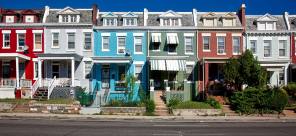

HM Revenue & Customs collected an extra £4.2bn in stamp duty tax last year on homes, seeing receipts for the tax jump by 69 per cent.
In data published today (January 31), the tax authority said residential stamp duty land tax (SDLT) receipts surpassed £10bn in the financial year to April 2022, compared to £6bn in the previous financial year.
Brokers said thresholds and allowances for the tax during this period did not keep up with inflation, and fear a fall in revenues this financial year as transaction levels dry up.
Today, the Bank of England also published data which showed mortgage approvals for house purchases decreased to 35,600 in December, from 46,200 in November.
This is the lowest since May 2020, and marks the fourth consecutive monthly decrease in mortgage approvals.
Adviser at Mather and Murray Financial, Samuel Mather-Holgate, said the latest stamp duty figures showed a short-sightedness from the government.
"Asset prices increased significantly between the tax year ending 2021 and the tax year ending 2022, while thresholds and allowances did not keep up with inflation," Mather-Holgate explained.
"This was great for the Treasury but is short sighted. By not indexing thresholds and allowances they have increased the tax burden on a population that is already going through a recession.
"This will mean a significant decrease in revenues for the next financial year as confidence is low and transaction levels will have dried up."
Following the last financial year, the government did reform the stamp duty thresholds.
One of the only tax cuts which was not reversed following former chancellor Kwasi Kwarteng's "mini" Budget, it saw the threshold change from £125,000 to £250,000 for all home buyers.
For first-time buyers, the change also meant they now begin to pay stamp duty after £425,000, compared to the previous £300,000 threshold.
Current chancellor Jeremy Hunt has said these changes will remain in place until March 2025.
Mather-Holgate said the biggest tool in the government's arsenal will be its ability to stimulate growth through targeted tax cuts.
"These need to be through business or a generic crowd-pleaser like a reduction in our eye-watering VAT rate," he said.
Chancellor Jeremy Hunt has suggested he will go light on tax cuts in the upcoming Budget, telling the BBC last weekend that significant tax cuts were "unlikely".
Uptick after a tax holiday
Director at Highcastle Estates, Zaid Patel, said with a 50 per cent increase in total stamp duty receipts, and a 69 per cent hike in residential "it looks like things are picking up".
London accounted for the highest amount of stamp duty tax, with 36 per cent of the total receipts coming from the England's capital.
However, Patel highlighted that the rise of stamp duty tax receipts is more likely down to the stamp duty holiday and "pent up demand", rather than a healthy increase in transactions.
During the pandemic, former chancellor and now prime minister Rishi Sunak introduced a stamp duty holiday to stimulate the housing market. It was in place from June 2020 to June 2021.
Govt's stamp duty tax bands after "mini" Budget
| Homeowner | First-time buyer | 2nd home | Overseas buyers |
|---|---|---|---|---|
£100,000 | 0 | 0 | £3,000 | £5,000 |
£200,000 | 0 | 0 | £6,000 | £10,000 |
£300,000 | £2,500 | 0 | £11,500 | £17,500 |
£400,000 | £7,500 | 0 | £19,500 | £27,500 |
£500,000 | £12,500 | £3750 | £22,500 | £32,500 |
£600,000 | £17,500 | £8750 | £25,500 | £37,500 |
Source: HW Fisher
The holiday enabled first-time buyers to avoid stamp duty land tax on up to £500,000 of a house purchase and on average, saved individual buyers £15,000.
The rates and thresholds for stamp duty land tax were last changed by then chancellor George Osborne in December 2014. Since then, house prices have surged on average by more than £100,000.
This had prompted some in the industry to call for changes to the tax bands so they better reflect the current market.
ruby.hinchliffe@ft.com



